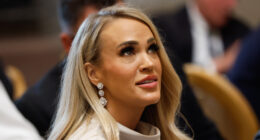
Fox News host Tucker Carlson is attempting to alert Republican congressional leaders and the GOP base that the Democrats, as of now, have a strong shot of holding the Congress in November.
Carlson said:
“Unpopular presidents drag their parties to the bottom in midterm elections. That’s the unchanging rule of politics. You saw it famously in 1994 with the Republican takeover of Congress after two disastrous years of Bill Clinton. You saw it in 2006 after Hurricane Katrina. You saw it in 2010 after ObamaCare. You saw it in 2018.”
He continued, noting that despite Biden’s unpopularity, the Democrats are on track to hold the majority in Congress as of now.
“So, there’s no question based on precedent that that’s about to happen once again in 2022, in November. That’s what everybody assumes and in fact, it may well happen. We’re certainly praying for it, but as of tonight, we have to be honest with you, the numbers don’t show that happening. Not even close. In fact, all the indications we have right now suggest that despite Joe Biden’s well-earned unpopularity, the Democratic Party still, again, as of tonight, has a strong chance of holding Congress in November.”
Tucker: The numbers don’t show that happening pic.twitter.com/aJOVCoMueF
— Acyn (@Acyn) August 19, 2022
Carlson noted that Senator Raphael Warnock (R-GA) has raised more money through donations than seven Republican senate candidates combined. He said:
“For example, last quarter, Raphael Warnock, that would be the thoroughly mediocre Democratic senator from Georgia, the guy who was caught on video appearing to commit spousal abuse (Remember that?) that guy raised more than $12 million online. His opponent, Herschel Walker, who everyone likes, raised less than half of that. So far, Raphael Warnock has raised an astounding amount of money. He’s hauled in more dollars online than seven Republican senatorial candidates combined: Candidates in North Carolina, Pennsylvania, Nevada, Ohio, Florida, Wisconsin and Georgia combined.”
Tucker: Rafael Warnock has hauled in more dollars online than seven Republican senatorial candidates combined pic.twitter.com/XQHL2np2Xb
READ RELATED: DoJ leak to NYT: Trump had 300-plus classified documents at Mar-a-Lago
— Acyn (@Acyn) August 19, 2022
In an opinion piece on Fox News, Carlson mentioned Senate Minority Leader Mitch McConnell’s comments about the House having a greater likelihood of flipping than the Senate.
McConnell said:
“There’s probably a greater likelihood the House flips than the Senate. Senate races are just different. They’re statewide. Candidate quality has a lot to do with the outcome.”
As I reported earlier this month, this was not the first time McConnell and other GOP Senators pressed the brakes on flipping the Senate.
Carlson’s response to McConnell:
“So, there’s the head Republican in the Senate conceding three months out that Republicans are probably not going to retake the Senate. Why is that? Well, the answer, of course, is in the final line you just heard. Some of the candidates are mediocre. That’s Mitch McConnell’s excuse and there’s some truth in that. Obviously, some of them are mediocre, but compared to what? Mediocre in the Congress. Well, let’s see. Dianne Feinstein hasn’t spoken a coherent sentence in years, hasn’t had trouble getting reelected. Eric Swalwell had sex with a Chinese spy. He’s still there. So, mediocre people get elected to office, lots and lots and lots of them do every cycle. So, what McConnell’s analysis really is, of course, is buck-passing. Don’t blame me. I didn’t choose these people. All right, but they’re still the nominees.”
The candidates McConnell referred to, but did not publicly state any names, are likely Mehmet Oz in Pennsylvania, Blake Masters in Arizona, and other candidates he did not support during the GOP primary.
Tucker Carlson’s assessment is correct. Nobody should take it for granted that the GOP will win the majority. Yes, it will be an uphill battle for the majority of GOP Senate races; but if the GOP base comes out in droves and unites behind the Republican candidates to stop the Biden administration’s far-left agenda, they will be in good shape to win. If even some GOP voters sit out in November, that hands the Democrats the majority in the Senate, and they no longer need to negotiate on legislation.
Despite the economy’s turmoil, the GOP messaging needs to be more convincing to win over undecided and Independent voters.
Source:






